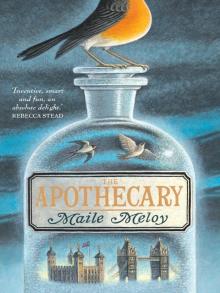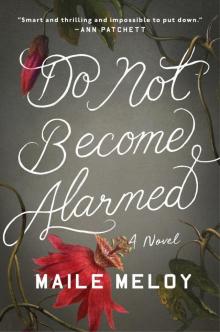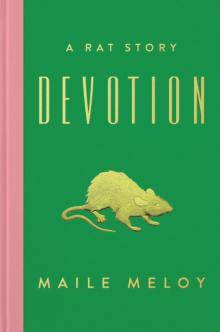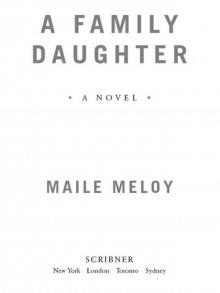- Home
- Maile Meloy
A Family Daughter Page 3
A Family Daughter Read online
Page 3
“Why aren’t you a rich girl, bella?” Gianni asked, lying in Abby’s narrow dorm bed.
“I think you should tell your father you’re not cynical enough to pull this off.”
“Miranda is rich,” he said. “I could marry her, and we could all live together, like now.”
“That won’t work.”
“The rich girls here don’t even like me,” he said. “Miranda laughs at me.”
“Not really.”
“I’m happy here,” he said. “In this terrible bed. But then I think of my father.”
“Maybe you could make the money.”
He shook his head patiently, as if she would never understand. “We need much more than that,” he said.
He was uncircumcised, which was alarming at first, and he was against condoms. “This is like going to swim in your stivali di gomma, ” he said. “How do you say this?” He mimed pulling them on.
“Rubber boots.”
“Rubber boots,” he said. “Exactly.”
But it seemed to be Safe Sex Week all the time on campus, with an earnest student handing out pamphlets in the cafeteria, which were even more alarming to Abby than Gianni’s unexpected foreskin. So they found ways not to fuck, to avoid the rubber boots and the horrible diseases. What Gianni wanted most was to watch Abby make herself come.
“I can’t do it if you’re watching,” she said. “I’m too shy.”
“Shy,”he said with disgust. “Pretend I’m not here.”
“Then I wouldn’t be doing it.”
“You should do it for your self .”
“Maybe,” she said. It took so much concentration, and boys did it for her so easily.
“You say this to tease me, because you know I want to see it,” he said. “I’ll give you fifty American dollars.”
“You need that money in your hope chest.”
“My what ?”
“For when you get married.”
He shook his head. “When I get married,” he said, “she will be so rich I can spend all my money so you will do this little trick.”
In November of her junior year, Abby was tired of not fucking. She went to Student Health and got a prescription for birth control pills, just in time for Gianni’s announcement that he was leaving for England. He hoped his chances for marriage would be better there.
“Don’t be sad, bella,” he said. “We had this nice time.”
Abby was more depressed, after he left, than she had expected to be. She went home for Christmas, and everything seemed bleak and colorless. Her mother was at a yoga retreat in Peru. Her father asked why she seemed down, but she deflected the question. There was nothing she could tell him: Gianni’s feelings about rubber boots? His desire for an English heiress? Everything was about sex or the pursuit of money, and her father would hate hearing about it.
In February, her father called to ask her to go skiing. He had just won a case that had taken all his time, and there’d been six inches of new snow during the week.
“I don’t want to drive all that way to ski,” she said.
“You can fly to Reno,” her father said. “I’ll meet you there.”
“I don’t know if I can get a flight.”
Miranda was pulling on a tight black minidress in front of the closet mirror and said, “If you’re flying to ski, go to Utah.”
“Miranda says we should go to Utah.”
“Well, Miranda’s a rich kid,” her father said. “Anyway, the snow’s better here. It’s been raining all week, and snowing in the mountains.”
Miranda considered the dress in the mirror, then turned around and considered it over her shoulder. The boys upstairs, one from Colombia and one from Bolivia, were having a Putita party on Friday, at which everyone had to dress like a little slut. Miranda thought it would help Abby out of her mood.
“I have work to do,” she told her father.
“You can bring your books,” he said. “The lifts close at four.”
“I have to work at the café, too.”
“Get a sub,” he said. “Don’t they have library jobs for girls like you?”
Miranda peeled the dress off. In heels and black bra and underwear, she looked through the closet again.
Abby said, “You should wear that.”
“Wear what?”
“I was talking to Miranda.”
“I’ll get the plane ticket,” he said. “It can’t be that much.”
“I have a paper due,” Abby said, though it wasn’t due until Thursday.
“Okay,” he said. The disappointment in his voice almost made her change her mind. But she’d just been home for Christmas. Miranda pulled another dress over her head, a red one with fringe that made her look like a sushi bar hostess. Abby shook her head.
“What’s the paper on?” her father asked.
“It’s a close reading of a poem, but I haven’t picked one yet.”
“How about ‘There once was a man from Nantucket’?”
Abby laughed. “I don’t think that’s on the syllabus.”
“Well, what then?”
“Maybe one by Auden.”
“What’s it about?”
“The sadness of people getting old, I guess.”
“Auden would want you to go skiing, while you’re young,” he said.
“I don’t think he would.”
“Shakespeare would.”
“Dad, I can’t. I’m sorry.”
“Okay,” he said. “You sure I can’t convince you?”
“I’m sorry,” she said. “Next time.”
“That was so sad,” Miranda said when Abby hung up the phone.
Henry loaded up his old skis and went alone, as the police reconstructed it later, leaving after work to drive up over the Donner Pass. While Abby was at the Putita party, with her shirt tied up like Daisy Duke’s and the Colombian boy’s hand on her bare waist, and while Miranda danced on the windowsill in the tight black dress and sling-backs, Henry Collins hit a patch of black ice. The car spun out of control, broke through a guardrail on the highway, and landed upside down sixty feet below.
The next morning, Abby got back to the dorm room first. She took a shower and then stood in a towel checking messages. There were two for Miranda, from boys she had stood up. The third was one of the waitresses asking Abby to fill in at the café. The fourth was her mother, crying, and before she said it, Abby knew.
6
CLARISSA HAD NEVERexpected anything to happen to Henry, so she had never considered the burden on Abby if something did. Even if she had thought about it, she could never have predicted the way Abby fell apart.
Clarissa had already gone to the police morgue to identify the body. She was led into a little space like a closet, where someone pulled open a curtain. Henry was on a gurney on the other side of a window, with only his face visible under a sheet. He was still and blue and badly bruised, with a star-shaped contusion on his forehead. She stayed a few minutes, feeling emptied out. Her therapist said she had defined herself in opposition to Henry since the divorce, like she had defined herself in opposition to her sister growing up, so it was natural that she would feel that a part of her was missing. She was glad she had seen him, and when her daughter came home from UCSD, Clarissa asked if Abby wanted to see him, too.
“I can’t,” Abby said.
“Maybe you’ll want to have seen him.”
“Don’t tell me what I want!” Abby said and shut herself in her room.
For a week, Abby didn’t go outside. She alternated between panic and fury, and wouldn’t let Clarissa touch her. Then the babysitter, Maricruz, brought food to the house and sat on the couch while Abby cried in her lap.
Henry, who had drawn up dozens of wills for other people, had died without one of his own. One of his friends, a lawyer named Jason Katz, offered to help with the estate, but Abby stalled. She didn’t know what to do with the house she had grown up in, and she wouldn’t take the phone or answer questions. She starte
d wearing Henry’s watch, which had survived the accident, and she lived in pajamas and refused meals, eating crackers out of the box. When Clarissa suggested once that she do some restorative yoga, Abby started crying again.
“Why don’t you give Jason power of attorney, and go back to school?” Clarissa finally asked.
“If you want me to leave, just say it.”
“I don’t,” Clarissa said. “I just think it would be good to have something to do.”
“I don’t want to go back to school,” Abby said. “It’s so stupid.”
“You’re young. You’re supposed to be stupid.”
“What would I do there?” Abby said. “I can’t do a close reading of a poem. I can’t eat in the cafeteria, when my hands shake all the time. I can’t go to parties, and stand around by a keg, and dance to the YMCA song.”
“Maybe there’s a poem that would help you.”
“I don’t want help from poems,” Abby said. “Fuck poems.”
Two months passed. Clarissa doubted that Abby would have been so destroyed if she, Clarissa, had died instead of Henry. She was jealous, and felt robbed of the consolation of consoling her daughter.
Jason Katz started to come by the house after work, to see how things were. He understood how hard it had been. Clarissa would pour him a beer, and he would drink half. Some days he rode his bicycle from work, with his pant legs clipped around his ankles. She started to look forward to his coming, and to think about him during the day.
He was in the kitchen one afternoon, and Clarissa was telling him how Abby had barely spoken to her all week, when her daughter came in, wearing one of Henry’s old plaid shirts over jeans, and the too-big watch.
“Stop talking about me,” Abby said. “Stop pretending this is something that happened to you. You left him thirteen years ago.”
“You’re my daughter,” Clarissa said, trying to keep her voice steady. “And you’re suffering.”
“So what? You can’t make that your drama!”
“I had to talk to someone.”
“If you want to fuck Jason, that’s your business, but don’t you dare use me as an excuse.”
Jason flushed and looked at the floor. “I think I should go,” he said, and he was out the door before Clarissa could stop him.
“Why did you do that?” Clarissa demanded.
“Why did I do that?”
“There’s nothing between Jason and me.”
“There will be,” Abby said. “There would be. I have to leave this house.”
“No, you don’t.”
“I keep thinking,” Abby said, “about how you always said I was like my dad. But part of me must be like you—that’s how it works. So now part of me is dead, and I don’t want the other part. I don’t want to be like you!”
She left the room, and Clarissa sat numbly at the table, feeling as if Abby had struck her. She tried to remember that her daughter was in pain. She tried to imagine how she would feel if her father died, but it was impossible; she couldn’t make herself believe it enough to imagine the feeling. Then she wondered if she was half Teddy and half Yvette. She didn’t think she was like her mother. She was more like her father. Margot was more like their mother.
Abby came back with two duffel bags, got a toothbrush from the bathroom, and took the bags outside to her car.
Clarissa followed her. “Abby, don’t do this.” It was cool out, and she didn’t have a jacket. “Don’t go.”
Abby put the bags in the backseat. “You wanted me to move on, right?”
“I don’t now,” Clarissa said. “Wait a while.”
“Don’t worry,” Abby said, getting into the car. “You’ll be fine.”
When her daughter had driven away, Clarissa went back inside and looked around. The house was silent. The power must have gone off and come back on, because the digital clock on the stove was blinking. She hadn’t noticed it before.
She had spent so much time wanting to be free of Henry and Abby: the husband she had followed at the expense of her own experiences, and the child who had chained her to a confining little town until it was simply her home and she couldn’t imagine leaving. But she had stayed, and now her captors had left her, and what did she have?
7
JAMIE WAS LIVING INSan Francisco when Clarissa called him about Abby. He was taking a class called The Bible as Literature, as a misguided attempt to understand his parents, and was thinking in Bible talk. Honor thy sister when she calls thee with another crisis. He was thirty-three years old, still hadn’t finished his bachelor’s degree, and had moved out of a girlfriend’s apartment onto a friend’s couch. His friend was a bassist and mellow about the arrangement, and Jamie had a job in a guitar store. It wasn’t a terrible life.
Five months had gone by since Henry died, and Clarissa told Jamie she thought her daughter was still dangerously depressed. Abby had moved back to San Diego, but school was out for the summer; her friends would be gone. She was waiting tables. Clarissa asked Jamie to call her.
“Why don’t you call her?” Jamie asked.
“She doesn’t want to talk to me.”
“I’ll don’t know that she’ll want me,” Jamie said. “But I’ll try.”
He called the number his sister gave him, but the phone just rang, and no machine picked up. He thought he had a good sense, from his dating life, of the hours when waitresses would be home, so he kept trying, but he couldn’t catch her. He guessed she was there but not answering. Finally, someone picked up the phone but didn’t say hello.
“Abby?” he said.
“Jamie.” She sounded relieved.
“I’ve been trying to call you.”
“Sorry,” she said.
“How’s the job?”
There was a pause. “I like it,” she said. “It’s sort of hectic and constant. You clear the table, someone sits down, you take their order, they eat the food, they leave and you clear the table again. It’s beautifully mindless.” She sounded as if she hadn’t talked to anyone in a while, as if she’d been saving this up, waiting for someone to ask.
“What if you forget what they ordered?” he asked.
“I write it down. That’s what keeps it mindless. Some girls memorize everything to show off.”
“Do you have a place?”
“A sublet,” she said. “I use one little room. I don’t even use the kitchen, I eat at work.”
“I was thinking of driving down to Baja,” he said. “Maybe I could stop on the way, if you’re around.” He didn’t have anything better to do.
There was a long pause. “Did my mother tell you to do this?” she asked.
“No.”
“You swear?”
“Yes,” he said. “She gave me your number, that’s all.”
There was another long silence, and then there was a choking sound at the other end of the line, and a high muffled sound, and he realized Abby was crying.
“Ab?” he said.
“Oh, God,” she said, sobbing. “It hurts so much. It hurts.”
When he got to San Diego, his legs stiff from the drive south, he went to Abby’s restaurant and took a table by the window. It was a big place with orange walls, turquoise trim, and vaguely southwestern food; there was a blackboard with the specials written on it. He looked for his niece among the cute waitresses, wondering which ones were the show-offs. When he found Abby, she looked shockingly grown-up, with the short white apron tied around her hips. She had composed herself since the phone call, and she came to his table with her pad and pencil.
“Can I getcha something?” she asked, mock folksy.
“I’ll have one of them there waitresses,” he said.
“Which one? We have the redhead, the brunette, and the little tattooed lesbian blonde.”
“One of each, please.”
“Coming right up.” She tucked the notepad in the front pocket of the hip apron. “Seriously, you want a sandwich or something?”
“Shouldn’t you
write it down to keep it mindless?”
“Yours I can remember,” she said.
“What’s good?”
“The turkey avocado with chipotle sauce. With sweet potato fries.”
“Sold.”
“Are you going to stand up and say hello?”
Jamie took his newly grown-up niece in his arms. Her notepad pressed against his thigh, her arms wrapped tightly around his back, and her soft hair brushed his chin. He felt suddenly nervous.
“I’m so glad you’re here,” Abby said, her voice muffled against his chest.
“I am, too,” he said.
The fiction of the Baja trip dissolved without comment, and Jamie stayed. He had left nothing solid behind: he had no apartment, just a few boxes in his friend’s garage, and the guitar store had divvied up his shifts. The kitchen had a breakfast table by the window, and Jamie learned how to use the shiny silver coffeemaker Abby had never bothered with. They had coffee at the table in the mornings, Abby in a white bathrobe, and she talked about her father.
“I feel responsible,” she said. “I should have gone skiing with him.”
“Then you’d be dead, too.”
“They think he might have fallen asleep on the road,” she said. “If I’d been there, he wouldn’t have fallen asleep.”
“You don’t know any of that.”
“He wanted me to go. I should have gone.”
“Abby.”
“He could have flown into Reno to meet me. Then he wouldn’t have been on that pass. We’d have been coming from the east.”
“Have you seen anyone about this?” Jamie asked, feeling awkward about it.
“I went to a counselor at Student Health, but I only went once. She told me to try writing things down. And I do some. Sometimes it helps me figure out what I think.”
“That seems good.”
“But what I think isn’t good.” Her face crumpled. “It’s been five months, and it’s still all I think about. My mother’s all lightness, and he was the solid part of me, the—I don’t know, the integrity . I feel like I was on a tether that kept me safe and it was cut.”

 The Apothecary
The Apothecary Both Ways Is the Only Way I Want It
Both Ways Is the Only Way I Want It Do Not Become Alarmed
Do Not Become Alarmed Devotion: A Rat Story
Devotion: A Rat Story A Family Daughter
A Family Daughter